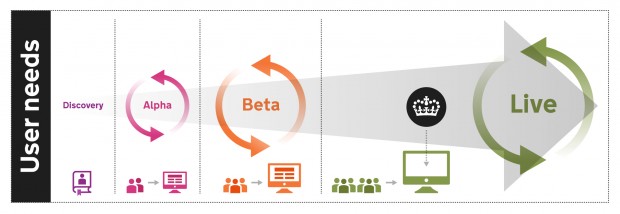Our user researchers work with project teams throughout a service lifecycle. They’re not just testing usability, they’re researching with users and feeding insights back to the team all the time.
Here are some of the things our researchers bring to a project team:
- Understanding user needs: identifying them, framing and prioritising them correctly.
- Informing the service design: helping build a picture of the end-to-end service across channels - both current and ideal service states.
- Guiding the product strategy: helping product managers understand which stories (and features) are most important and how best to prioritise and group them to deliver value to end users.
- Providing feedback to policy design: some things about policy can only be learned when they’re being implemented. User research offers opportunities to gather feedback useful in shaping policy design.
- Helping the entire team maintain an empathetic view of their end users: it’s easy to fall back into stereotypes, assumptions or self-referential design. We help the team make decisions based on an understanding of end users.
- Improving usability of the digital service: we make sure that the digital service is designed so that it’s as easy as possible to understand and use.
- Understanding assisted digital needs: we help service managers understand challenges faced by users who require assistance in using digital services and help explore the best ways to support those challenges.
- Identifying and exploring opportunities to promote channel shift to digital: we help service managers identify moments in the service that are opportunistic for encouraging people to choose digital. We also help experiment in making channel shift more effective.
When research doesn’t happen right
If you've had a bad experience with research in the past, chances are research wasn’t happening at the right time or in the right way.
Front load research too much and you might end up with rich insights about your customer base and what they want, but you can also end up with lots of great ideas that aren't technically or commercially feasible.
Leave research until the end of the project and you run the risk of applying ‘lipstick to a pig’, as in, making something really usable but which no one wants to use because it's not actually satisfying a user need.
Get real value from user research
By including user research throughout your project, you can make sure that you’re always getting actionable insights, learning things that help you make informed day-to-day decisions about your project, as well as continuing to grow a strategic understanding of your service and your customers.
That’s how you get real value from user research.
Keep in touch. Sign up to email updates from this blog. Follow Leisa on Twitter.

3 comments
Comment by Dara posted on
Love this post. We had a successful policy change a few years ago based on user research, it was a very proud moment!
Something I run up against is that "there are also business needs, not just user ones". For example, shifting user perceptions, service awareness, or service focus.
How as a researcher do you incorporate needs into the prioritization that might not be user focused. I struggle with this and am often told that users' (current) needs are not enough, that the organization has strategic needs.
Keep up the great work at GDS, your work is helping public sector digital workers everywhere!
Comment by Leisa Reichelt posted on
Thanks Dara.
Starting with user needs is baked into everything that we do in digital in government now, from the design principles (https://www.gov.uk/design-principles) to the Digital by Default Service Standard (https://www.gov.uk/service-manual/digital-by-default) so that makes it less likely for projects to start without a clear understanding of the user need.
In our experience, most of the time where there is a business need to do something, it has originally come from a belief that there is also a user need, so if you can connect those two together then you have better chance of success.
Comment by Dara posted on
Thanks! That actually helps a lot in terms of the conversations I'm having.